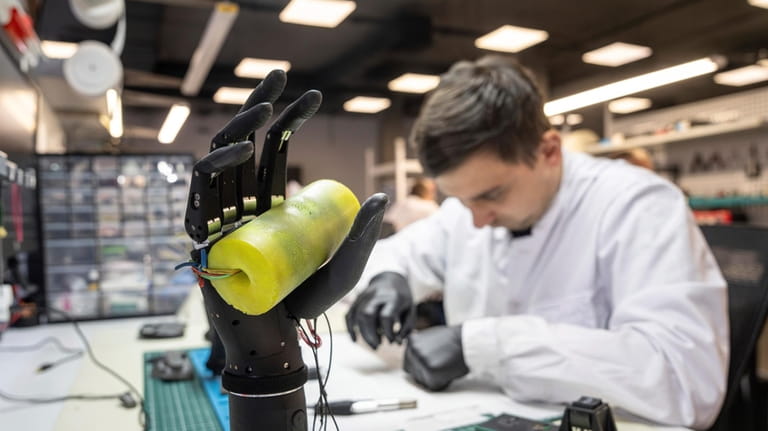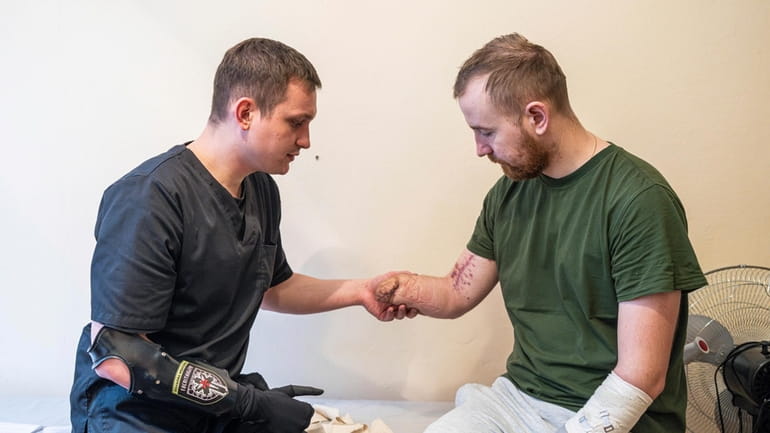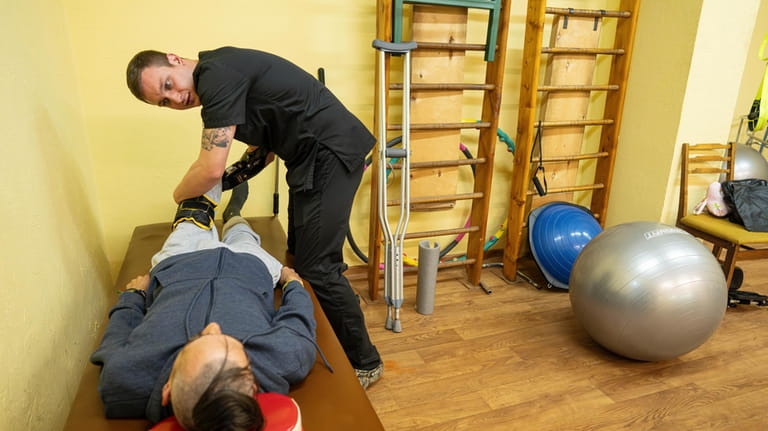An Unsung Hero of Ukraine
"There are fewer [bionic] arms available than lost ones.""I now know a lot not only from textbooks but also from my own experience.""I feel uncomfortable when I'm without the prosthesis.""But when I have the bionic arm on, I feel comfortable. It's like a part of you."Alexis Cholas, volunteer combat medic, hospital rehabilitation specialist, Ukraine
 |
| Engineer Oleksandr collects bionic prostheses for Ukrainian soldiers at the Esper Bionics office in Kyiv, Ukraine, Tuesday, Oct. 31, 2023. Credit: AP/Evgeniy Maloletka |
Since
the conflict that Russia inflicted on Ukraine in February 2022, an
estimated 20,000 Ukrainians have suffered amputations; soldiers for the
most part, whom blast wounds caused the loss of arms or legs. Ukrainians
can access artificial limbs through the country's public health-care
system. Artificial limbs are available to anyone who needs them, free of
charge. Conventional artificial limbs cost between $800 and $2,800. But
a bionic artificial limb, a far more sophisticated device enabling the
wearer to perform tasks of a delicate nature, have a far higher cost, up
to $50,000.
So,
while the state steps in to provide a basic replacement of an amputated
limb, anyone with thoughts of being able to replace natural fine motor
skills to allow for an amputee to continue working in a profession
requiring delicacy of movement in fine-tuned mode, would yearn for a
bionic arm. That type of costly prosthetic enables natural and fluid
movements, unlike the functionality of the basic artificial limb.
26-year-old
Alexis Cholas lost his right arm while operating as a volunteer combat
medic close to the front lines in eastern Ukraine. With that, his
profession as a surgeon was no longer possible. Despite which, as one of
a small number of amputees, he was fitted with a bionic prosthesis, far
more advanced than the basic, providing greater mobility. Thanks to his
bionic hand, his movements are natural and fluid, enabling him to
remove a bandage with ease, and dress a patient's wounds on his own,
without nursing assistance.
Bionic
artificial limbs are sophisticated replacements picking up electrical
signals from the muscles above the amputation site in bioelectric
technology that functions in carrying out an intended motion. Before
2022, the manufacturer of the bionic arm installed for Dr. Cholas by
Esper Bionics targeted the U.S. market until a sharp rise in demand in
Ukraine for prosthetic limbs leading to Esper distributing 70 percent of
its products now in Ukraine.
 |
| Dr. Alexis Cholas, left, examines the amputated limbs of Ukrainian soldier Volodymyr Symyshyn at the hospital in Kyiv, Ukraine, Wednesday, Nov. 8, 2023. Credit: AP/Evgeniy Maloletka |
Produced
in Kyiv, the company is working at full tilt, over 30 workers producing
roughly a dozen bionic hands monthly. A small group of engineers
program, assemble and test the bionic arms known as Esper Hand. Despite
ramping up production, the company struggles to meet demand. Close to
120 people are on the wait list for the prosthetic which, in Ukraine,
the company absorbs no profit for, selling the arm for about $7,000,
enough to just cover production, whereas the hand sells in the U.S. for
over $20,000.
Another
feature of the Esper Hand is artificial intelligence, powering an
ability to adapt over time, as it learns the wearer's unique
interactions with the hand. Dr. Cholas returned to volunteering as a
combat medic on the front lines once he was outfitted with his bionic
arm. He maintains his day job in Kyiv as a rehabilitation specialist in a
public hospital, where his patients are members of the military or
civilians who have lost limbs. His own amputation experience aids him in
developing rapport with his patients.
 |
| Dr. Alexis Cholas, left, examines an amputated limb of a Ukrainian soldier at the hospital's rehabilitation center in Kyiv, Ukraine, Wednesday, Nov. 8, 2023. Credit: AP/Evgeniy Maloletka |
Labels: Alexis Cholas, Amputations, Prosthetics, Russian Invasion of Ukraine, Ukrainian War Casualties, War Medics

<< Home